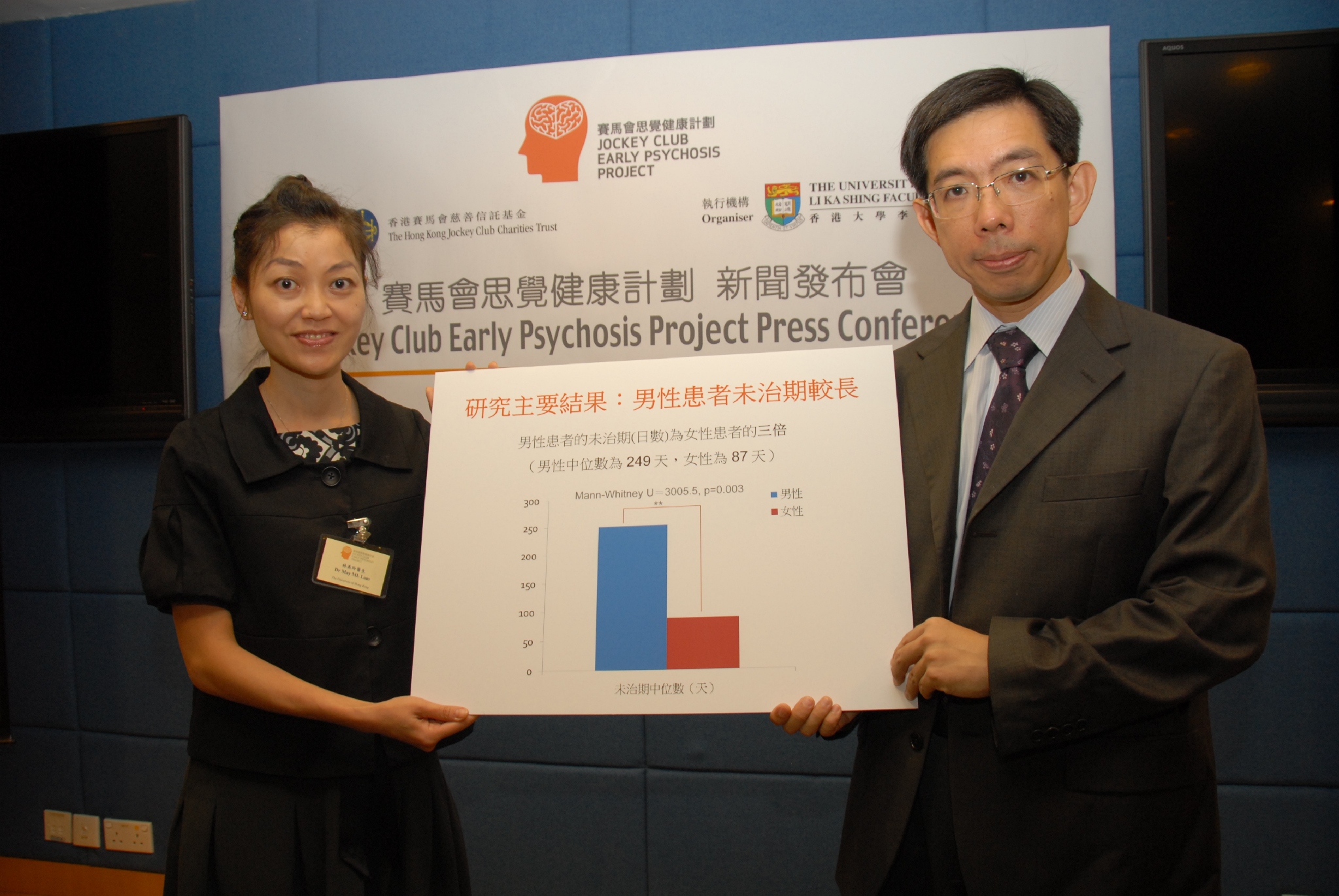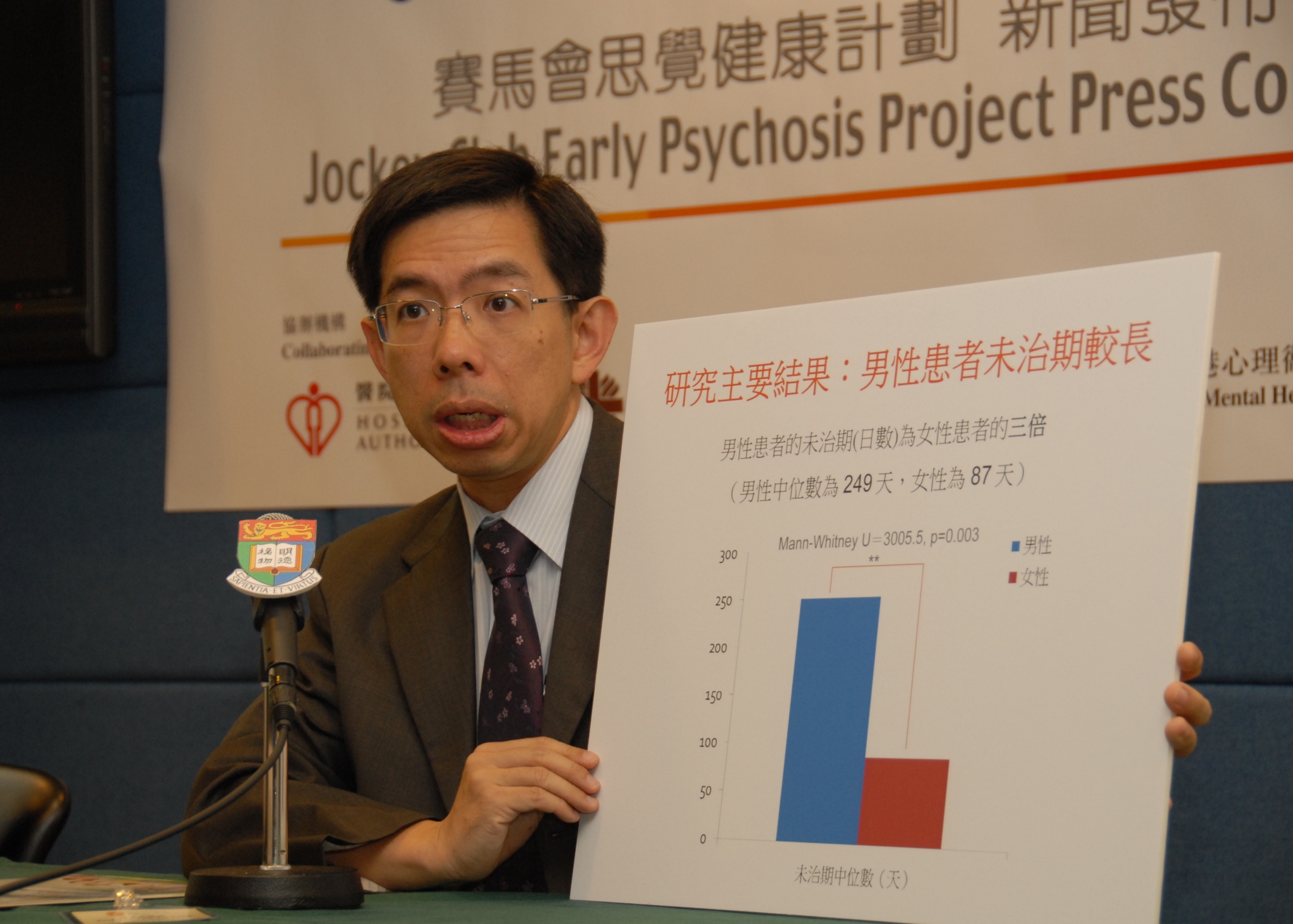Media
Early Results from the Jockey Club Early Psychosis (JCEP) Project
06 Oct 2010
Male psychosis patients in Hong Kong have
longer delays and poorer response to treatment
Psychosis is a common mental condition which is found in approximately 1 in 100 people. Evidence suggests that delayed treatment may lead to compromised outcomes in the illness, and early identification of psychosis can increase the effectiveness in treatment by medications and psychosocial care. To investigate the effective intervention for early psychosis, the Jockey Club Early Psychosis (JCEP) Project was funded by the Hong Kong Jockey Club Charities Trust and executed by the Department of Psychiatry, LKS Faculty of Medicine, HKU. Data from the JCEP Project revealed a gender related Duration of Untreated Psychosis (DUP) pattern in psychosis patients in Hong Kong, in which men have significantly longer DUP compared with women (a median of 249 days in men vs. 87 days in women). As such, tailored interventions and public education which addressed the gender specific issues are duly called for.
About DUP
Psychosis is a common mental condition in which the affected person may experience hallucinations, delusions, and disorganized thoughts and speech. DUP is the difference in time between the appearance of symptom(s) and the first psychiatric treatment. The longer the DUP, the worse the clinical picture and treatment outcome.
Dr May LAM Mei‐ling, Chairperson of the JCEP project's research subcommittee and Clinical Assistant Professor at the Department of Psychiatry, The University of Hong Kong Li Ka Shing Faculty of Medicine explains why the study of DUP is important, "During this prolonged psychotic period, the chance for developing severe secondary complications increases. For instance, patients begin to have problems in their social and family life, as well as develop psychiatric complications, where they may exert irreversible damages to the patients." Therefore, one of the key objectives of early intervention services is to shorten the DUP.
Research Findings
The major results show that median of DUP is 93 days in Hong Kong. Worldwide studies on DUP have shown varied findings, ranging from a median of 27 to 322 days in countries with early intervention services. Interestingly, in Hong Kong, men have significantly longer DUP compared with women (a median of 249 days in men vs. 87 days in women).
The study also shows that men presented with more negative symptoms (e.g., poverty of speech and thought, lack of facial expression, lost of interest and motivation, unable to take care of their hygiene, withdraw from social networks) and worse social and occupational functioning level, compared with their female counterparts after their treatment. They also had more schizoid and schizotypal personality traits (eg, solitary, suspicious, and superstitious traits) before their illnesses.
Results of this study raise concerns about the help‐seeking pattern in local male patients. "They are worse in many aspects compared with female patients. Apart from a possible protective effect of oestrogen, this may also reflects a tendency to keep problems to oneself and reluctance in help‐seeking in men," remarks Professor Eric CHEN Yu‐hai, Project Director and Professor at the Department of Psychiatry, The University of Hong Kong Li Ka
Shing Faculty of Medicine.
Research Methodology
Since June 2009 the JCEP project has recruited over 240 patients with first onset psychosis and recruitment is ongoing. Data from the first 183 patients was analysed in which 74 were male and 109 were female. Patients aged between 26 and 55 years old who experienced a first‐episode psychosis and treated at any of the 11 Hospital Authority (HA) psychiatric clinics. Patients receive assessments on their clinical, cognitive and psychosocial well‐being at multiple time points including study entry. Assessments include social and occupational functioning, premorbid adjustment, as well as delay in receiving first treatment after symptom onset ("DUP").
Study Implications
The results make a strong case for specialized early intervention such as the JCEP project, a service in that targets different needs of patients. Public education programmes and early interventions which address the fact that male are more reluctant to disclose their problems and high expectations of resuming work immediately after remission will only create more stress in patients because society has pervasive work‐related stereotypes in male, are useful to cope with the gender difference in help seeking and treatment outcome for early psychosis.
About Psychosis
Psychosis refers to a set of symptoms that include hallucinations, delusions, and disorganized thoughts and speech. It is a physiological condition related to an imbalance in certain chemicals in the brain called "neurotransmitters". Multiple aspects of a person's life can be affected by this condition, including psychosocial wellbeing and functioning. Symptoms can be effectively controlled by medications that modulate neurotransmitter activities, and patients benefit from psychosocial intervention especially during the early stage of the disease. For more information, please visit: www.jcep.hk
About JCEP Project
Led by the Department of Psychiatry, The University of Hong Kong Li Ka Shing Faculty of Medicine, JCEP is a five‐year project in collaboration with Hospital Authority, Caritas‐Hong Kong and the Mental Health Association of Hong Kong. A multi‐disciplinary team, comprising social workers, nurses, occupational therapists and researchers, has been set up to serve early psychosis patients aged over 25. It is expected that about 1,000 patients will receive individualised, phase‐specific intervention services in the first two to four years after their first episode of psychosis. The team will provide specialised case management and psycho‐social interventions by engaging the patients through home visits, phone contact, web‐based communication and tracking system. Support for affected families will also be offered to help patients attain a full functional recovery.
For news photos and powerpoint slides, please visit the website at:
http://www.med.hku.hk/v1/news-and-events/press-releases/



